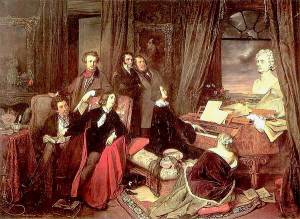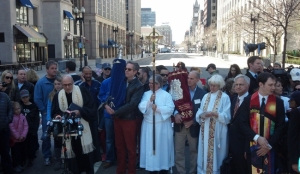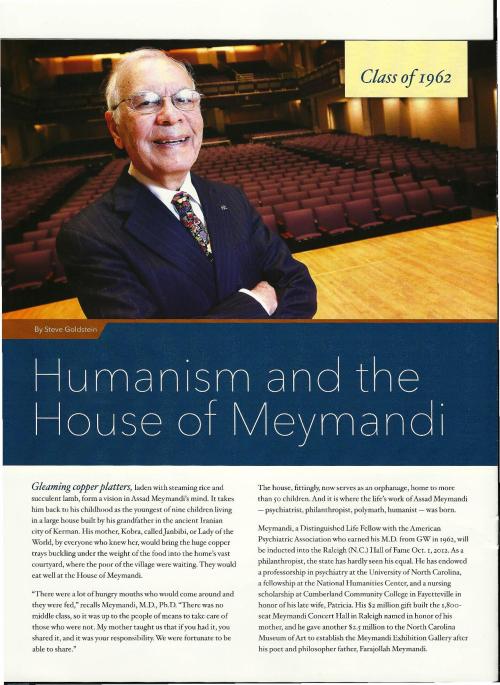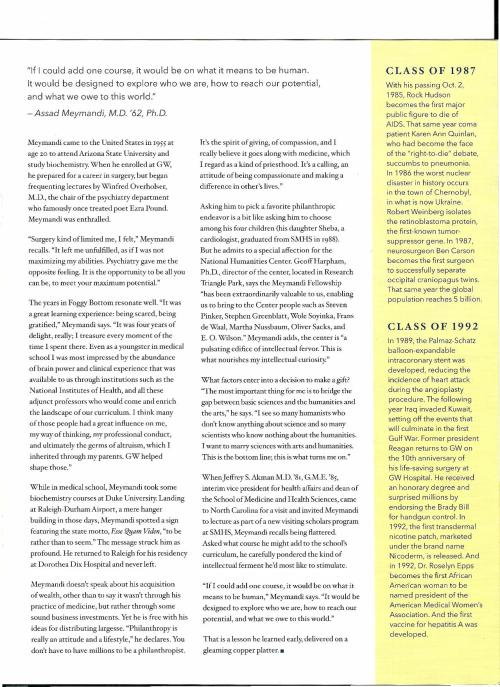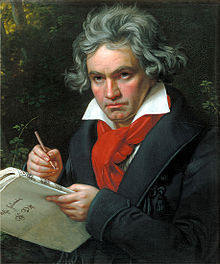“Monday Musings” for Monday October 13, 2013
Volume III. No. 39/133
By Assad Meymandi, MD PhD, DLFAPA*
Reflections
Three things I do not understand:
1) CEOs of big businesses like Merrill Lynch who send their companies to near bankruptcy and exit with a quarter billion dollar retirement package.
2) Coaches who compile a less that a mediocre record, yet get contract extension and a whopping raise in their salaries sending their annual compensation into millions while our teachers barely make ends meet.
3) Student athletes who can barely read and write. They work like slaves to generate a product with sales in the billions of dollars yet they get punished for accepting any gift from fans. This is a repetition of 17th adn18th century slavery, and the epitome of hypocrisy and unfairness. The entire system is unethical. It should be illegal and ought to be banned. One reasonable solution is to pay the student athlete a salary and pay teachers to tutor them and bring up academically, while they play their sport.
World Chess Championship in Raleigh
Masters from all over the world will be convening for 2014 chess championship. The 2013 champion is a 22 year old Norwegian, Magnus Carlsen who became a grandmaster at age 13. It would be exciting if our Raleigh Visitor’s Bureau would attempt to bring the match to Raleigh.
I was privileged to be in Reykjavick in 1972 and see the late Bobby Fisher playing chess with his Russian opponent Boris Spassky, about whom I have written in the past. What impressed me about the young Bobby, besides his bad behavior and total paranoia and mistrust for everyone, was his total mastery of the game, and his brilliance. His kind of brilliance was unfortunately blinding and not illuminating. It was more damaging than benefiting.
To me, Bobby Fischer was a good reminder of Richard Wagner (1813-1883), the most brilliant opera composer, writer and thinker of the 19th century. Wagner’s biological father was a Jew. Like Wagner, Fischer was also born to Jewish parents, yet like Wagner, in his life time, he piled an incredible amount of derogation and insult on Jews. Like Wagner, Fischer was an unrepentant and zealous anti-Semite.
There are plenty of reasons to bury the memories of Bobby Fischer and let him fade into dustbin of oblivion. But his brilliance in chess may be selectively used as a role model for teaching focus, determination and devotion to learning to our young people. He provides a good example of how to train the brains of our children and grandchildren. Let us celebrate him, and his contributions to the honored and honorable game of chess.
David Edwards/Le Laboratoire
David Edwards, a professor of Biomechanics at Massachusetts Institute of Technology (MIT) has started a gallery at the Louvre Museum in Paris that truly combines science and art, dealing with how a primitive, nondescript stem cell is transformed into a neuron. David is so good at what he does, and I am so impressed by his brilliant mind and abundant practical imagination, that I think any one going to Paris ought to plan to go see this exhibit. He is so much in touch with how science and humanities overlap that we might invite him to become a Meymandi Fellow at the National Humanities Center in RTP.
Post Traumatic Stress Disorder (PTSD) and Domestic Violence
October is Domestic Violence Awareness Month. The ravages to two wars US has been involved for the past dozen of years is directly related to ever higher incidence of PTSD. More human lives (both male and female) are lost to domestic violence. 2011 recorded the highest number since we have been keeping records. The victims, especially children, are severely scarred and emotionally abused. Domestic violence is of epidemic proportion in certain segment of our society. Iraq war has worsened the rot on families of military returnees who experience post- traumatic stress disorder.
Fortunately, we have Interact of Wake County, a worthy organization that is taking the matter of domestic violence seriously. Interact is providing safety, shelter and emotional support for the victims and their families. Interact is shining light on the murky and unpleasant landscape of this unwelcome epidemic. Interact deserves the support of everyone.
Repulsive Public Events
It is unconscionable for print and electronic media to devote so much space and time to absolutely repulsive stories dealing with people consuming huge amounts of food (hot dogs and doughnuts) for a cause or a prize. We have seen these races where people gorge 12 doughnuts or 2400 calories to run four miles which burns about 400 calories, to raise money for a worthy cause. The goal of raising funds for a worthy cause is holy, but the method is most repulsive. With the epidemic of obesity causing diabetes, hypertension, and cardiovascular disease, I believe your story to encourage gluttony, profligacy and self indulgence was most unwise. I believe people ought to be encouraged to fast, lower caloric intake, and lose weight, while they run and engage in fund raising.
Beethoven, The Mysterious Metaphysical Force of Deity
In 1824, Ludwig Van Beethoven was deaf. He was ill, temperamental, grouchy and uncooperative. He was 53 years old and ready to die.Yet he composed the majestic Ninth Symphony. I have heard the Ninth in many venues in Europe, Australia, America and even Africa, to audiences of tens of thousands. NC Symphony’s performance under the baton of Maestro Grant Llewellyn belongs right up there with the National Anthem of Europe conducted by the late Leonard Bernstein and the NY Philharmonic…Bravo!
An Opera House for Raleigh
Gaetano Donizetti was one of the three bell canto opera composers (the others were Giacomo Rossini and Vincenzo Bellini) who made brutal demands on the vocal cords of his lady singers. We need to bring more of their operas to Raleigh. Also, the idea of Raleigh having its own opera House is most intriguing.
Raleigh is inching closer to becoming a late 16th century Florence where the arts, music, poetry and dance flourish; where brisk intellectual conversation and children’s laughter fill the air of its vast parks; where fountains flow with life and energy and where academia and business meet their maximum potentials. Raleigh is the essence of the NC State’s Motto, “Esse Quam Videri”, to be rather than to seem. Perhaps we can fit the new opera house in soon to be born Dix Park.
*The writer is Adjunct Professor of Psychiatry, University of North Carolina School of Medicine at Chapel Hill, Distinguished Life fellow American Psychiatric Association, and Founding Editor and Editor-in-Chief, Wake County Physician Magazine (1995-2012). He serves as a Visiting Scholar and lecturer on Medicine, the Arts and Humanities at his alma mater the George Washington University School of Medicine and Health.



